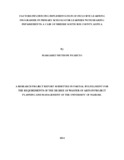| dc.description.abstract | The Kenya Vision 2030 aims at achieving a globally competitive and quality education, training
and research for sustainable development. The Vision 2030 recognizes the role of integrating all
special needs education into learning and training institutions. According to the Kenya National
Bureau of Statistics (2009) 3.5 percent (1.3 million) of the total population are people with
disabilities in Kenya. As a result of this high numbers of people with disability, the government
and lead agencies in education sector have come up with the programme of inclusive education
in learning institutions. The study assessed the factors influencing implementation of inclusive
learning programme in primary schools for Learners with hearing impairments in Mbeere South
Sub County, Kenya. The objectives of the study were to assess the influence of institutional
based factors, influence of teaching personnel, and influence of economic factors and determine
the influence of support services on implementation of inclusive learning programme in primary
schools for Learners with hearing impairments in Mbeere South Sub County. The study used a
descriptive survey design. The population of the study was a total of 380 teachers (190 school
heads and 190 teachers with knowledge of inclusive education). A sample of 114 respondents
was picked using stratified random sampling and proportionate sampling. Questionnaire was
used to collect data. Ten (10) teachers were used for Pilot testing before the commencement of
the study. Data analysis was done using Statistical Package for Social Sciences and Ms Excel.
Descriptive statistics was computed and data is presented using tables. The study found
institutional physical facilities influences implementation of inclusive programme for Learners
with hearing impairments in public schools as indicated by 85 respondents (74.6%). Most
inclusive schools have inadequate trained teachers on inclusive education skills as indicated by
105 respondents (92.1%) that they have 1-5 male teachers in their schools. The Most inclusive
schools are supported by government, NGOs and other donors. From the study, 101 respondents
(88.8 %) received 51-100% of their support from government, 107 respondents (93.9%) receive
1-10% support from parents and 2 respondents (1.8%) indicated that they received support from
donors. The information generated will be used by government departments in the ministry of
education, government agencies, future scholars and other stakeholders to come up with learning
programmes which will benefit Learners with hearing impairments. | en_US |

